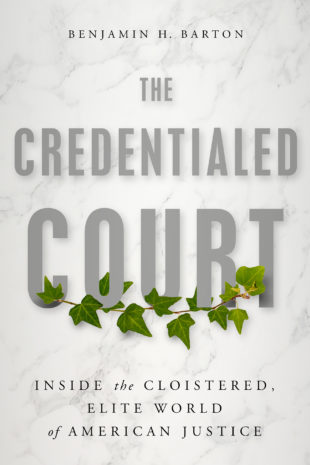
Earlier this year, Encounter Books published a new history of the membership of the Supreme Court from its first years to today, The Credentialed Court, by University of Tennessee Law Professor Benjamin H. Barton. Barton points out that the current membership is historically narrow in terms of life experience. All justices but one have gone to Ivy League law schools; most have been lower court judges; an increasing number are former law clerks. Nothing wrong with any of that–but perhaps something is lost when the justices’ backgrounds are so circumscribed and similar. For example, do the backgrounds of the justices influence their work in religion clause cases? It’s hard to see why that would not be the case. Would the Court’s jurisprudence over the last 50 years have looked different with the graduate of an evangelical college on the bench–or a yeshiva or madrassa?
Looks very interesting. Here’s the publisher’s description:
The Credentialed Court starts by establishing just how different today’s Justices are from their predecessors. The book combines two massive empirical studies of every Justice’s background from John Jay to Amy Coney Barrett with short, readable bios of past greats to demonstrate that today’s Justices arrive on the Court with much narrower experiences than they once did. Today’s Justices have spent more time in elite academic settings (both as students and faculty) than any previous Courts. Every Justice but Barrett attended either Harvard or Yale Law School, and four of the Justices were tenured professors at prestigious law schools. They also spent more time as Federal Appellate Court Judges than any previous Courts. These two jobs (tenured law professor and appellate judge) share two critical components: both jobs are basically lifetime appointments that involve little or no contact with the public at large. The modern Supreme Court Justices have spent their lives in cloistered and elite settings, the polar opposite of past Justices.
The current Supreme Court is packed with a very specific type of person: type-A overachievers who have triumphed in a long tournament measuring academic and technical legal excellence. This Court desperately lacks individuals who reflect a different type of “merit.” The book examines the exceptional and varied lives of past greats from John Marshall to Thurgood Marshall and asks how many, if any, of these giants would be nominated today. The book argues against our current bookish and narrow version of meritocracy. Healthier societies offer multiple different routes to success and onto bodies like our Supreme Court.